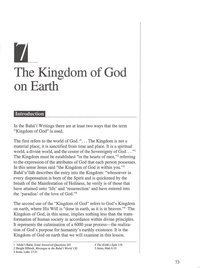The Significance of Bahá’u’lláh’s Revelation/The Kingdom of God on Earth
The text below this notice was generated by a computer, it still needs to be checked for errors and corrected. If you would like to help, view the original document by clicking the PDF scans along the right side of the page. Click the edit button at the top of this page (notepad and pencil icon) or press Alt+Shift+E to begin making changes. When you are done press "Save changes" at the bottom of the page. |
The Kingdom of God
on Earth
Introduction
In the Baha’i Writings there are at least two ways that the term “Kingdom of God” is used.
The first refers to the world of God. “. .. The Kingdom is not a material place; it is sanctified from time and place. It is a spiritual world, a divine world, and the center of the Sovereignty of God....”! The Kingdom must be established “in the hearts of men,”? referring
to the expression of the attributes of God that each person possesses.
In this sense Jesus said “the Kingdom of God is within you.”? Baha’u’llah describes the entry into the Kingdom: “whosoever in every dispensation is born of the Spirit and is quickened by the breath of the Manifestation of Holiness, he verily is of those that have attained unto ‘life’ and ‘resurrection’ and have entered into the ‘paradise’ of the love of God.”*
The second use of the “Kingdom of God” refers to God’s Kingdom on earth, where His Will is “done in earth, as it is in heaven.”> The Kingdom of God, in this sense, implies nothing less than the transformation of human society in accordance within divine principles. It represents the culmination of a 6000 year process—the realization of God’s purpose for humanity’s earthly existence. It is the Kingdom of God on earth that we will examine in this lesson.
1 ‘Abdu’l-Baha, Some Answered Questions 241 4 The Kitéb-i-I[gdn 118 2 Shoghi Effendi, Messages to the Bahd’i World 130 5 Jesus, Matt 6:10 3 Jesus, Luke 17:21
73
[Page 74]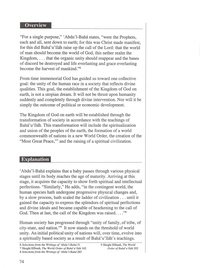 Overview
Overview
“For a single purpose,” ‘Abdu’1-Baha states, “were the Prophets, each and all, sent down to earth; for this was Christ made manifest, for this did Baha’u’ lah raise up the call of the Lord: that the world of man should become the world of God, this nether realm the Kingdom, . . . that the organic unity should reappear and the bases of discord be destroyed and life everlasting and grace everlasting become the harvest of mankind.’”®
From time immemorial God has guided us toward one collective goal: the unity of the human race in a society that reflects divine qualities. This goal, the establishment of the Kingdom of God on earth, is not a utopian dream. It will not be thrust upon humanity suddenly and completely through divine intervention. Nor will it be simply the outcome of political or economic development.
The Kingdom of God on earth will be established through the transformation of society in accordance with the teachings of Baha’u’llah. This transformation will include the spiritualization and union of the peoples of the earth, the formation of a world commonwealth of nations in a new World Order, the creation of the “Most Great Peace,”” and the raising of a spiritual civilization.
Explanation
‘Abdu’1-Baha explains that a baby passes through various physical stages until its body reaches the age of maturity. Arriving at this stage, it acquires the capacity to show forth spiritual and intellectual perfections. “Similarly,” He adds, “in the contingent world, the human species hath undergone progressive physical changes and, by a slow process, hath scaled the ladder of civilization . . . until it gained the capacity to express the splendors of spiritual perfections and divine ideals and became capable of hearkening to the call of God. Then at last, the call of the Kingdom was raised. . . .”*
Human society has progressed through “unity of family, of tribe, of city-state, and nation.”” It now stands on the threshold of world unity. An initial political unity of nations will, over time, evolve into a spiritually based society as a result of Baha’u’llah’s teachings.
6 Selections from the Writings of ‘Abdu’l-Baha 31 9 Shoghi Effendi, The World 7 Shoghi Effendi, The World Order of Bahd’u’llah 162 Order of Bahd’u'lldh 202 8 Selections from the Writings of ‘Abdu’l-Bahd 285
74
[Page 75]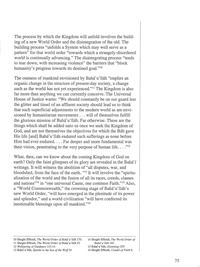 The process by which the Kingdom will unfold involves the building of a new World Order and the disintegration of the old. The
building process “unfolds a System which may well serve as a
pattern” for that world order “towards which a strangely-disordered
world is continually advancing.” The disintegrating process “tends
to tear down, with increasing violence” the barriers that “block
humanity’s progress towards its destined goal.”!°
The process by which the Kingdom will unfold involves the building of a new World Order and the disintegration of the old. The
building process “unfolds a System which may well serve as a
pattern” for that world order “towards which a strangely-disordered
world is continually advancing.” The disintegrating process “tends
to tear down, with increasing violence” the barriers that “block
humanity’s progress towards its destined goal.”!°
The oneness of mankind envisioned by Baha’u’ lah “implies an organic change in the structure of present-day society, a change such as the world has not yet experienced.”!! The Kingdom is also far more than anything we can currently conceive. The Universal House of Justice warns: “We should constantly be on our guard lest the glitter and tinsel of an affluent society should lead us to think that such superficial adjustments to the modern world as are envisioned by humanitarian movements . . . will of themselves fulfill the glorious mission of Baha’u’llah. Far otherwise. These are the things which shall be added unto us once we seek the Kingdom of God, and are not themselves the objectives for which the Bab gave His life [and] Baha’u’llah endured such sufferings as none before Him had ever endured. . . . Far deeper and more fundamental was their vision, penetrating to the very purpose of human life. . . .”!”
What, then, can we know about the coming Kingdom of God on
earth? Only the faint glimpses of its glory are revealed in the Baha’
writings. It will witness the abolition of “all disputes, war, and bloodshed, from the face of the earth. ”’? It will involve the “spiritualization of the world and the fusion of all its races, creeds, classes and nations’ in “one universal Cause, one common Faith.” Also, a “World Commonwealth,” the crowning stage of Baha’u’Ilah’s new World Order, “will have emerged in the plenitude of its power and splendor,” and a world civilization “will have conferred its inestimable blessings upon all mankind.’’'®
10 Shoghi Effendi, The World Order of Bahd’u’llah 170 14 Shoghi Effendi, The World Order of
11 Shoghi Effendi, The World Order of Bahd’u’llah 43 Bahda’w’llah 162 12 Wellspring of Guidance 113-14 15 Baha’ u’llah, Gleanings 255 13 Baha’u’llah, Epistle to the Son of the Wolf 34 16 Shoghi Effendi, Citadel of Faith 6
75
[Page 76]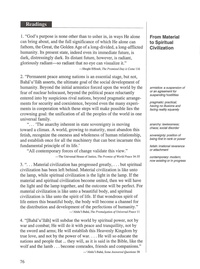 1. “God’s purpose is none other than to usher in, in ways He alone
can bring about, and the full significance of which He alone can
fathom, the Great, the Golden Age of a long-divided, a long-afflicted
humanity. Its present state, indeed even its immediate future, is
dark, distressingly dark. Its distant future, however, is radiant,
gloriously radiant—so radiant that no eye can visualize it.”
1. “God’s purpose is none other than to usher in, in ways He alone
can bring about, and the full significance of which He alone can
fathom, the Great, the Golden Age of a long-divided, a long-afflicted
humanity. Its present state, indeed even its immediate future, is
dark, distressingly dark. Its distant future, however, is radiant,
gloriously radiant—so radiant that no eye can visualize it.”
—Shoghi Effendi, The Promised Day is Come 116
2. “Permanent peace among nations is an essential stage, but not, Baha’u’ lah asserts, the ultimate goal of the social development of humanity. Beyond the initial armistice forced upon the world by the fear of nuclear holocaust, beyond the political peace reluctantly entered into by suspicious rival nations, beyond pragmatic arrangements for security and coexistence, beyond even the many experiments in cooperation which these steps will make possible lies the crowning goal: the unification of all the peoples of the world in one universal family.
“... ‘The anarchy inherent in state sovereignty is moving toward a climax. A world, growing to maturity, must abandon this fetish, recognize the oneness and wholeness of human relationship, and establish once for all the machinery that can best incarnate this fundamental principle of its life.’
“All contemporary forces of change validate this view.”
—tThe Universal House of Justice, The Promise of World Peace 34-35
3. “. .. Material civilization has progressed greatly, . . . but spiritual civilization has been left behind. Material civilization is like unto the lamp, while spiritual civilization is the light in the lamp. If the material and spiritual civilization become united, then we will have the light and the lamp together, and the outcome will be perfect. For material civilization is like unto a beautiful body, and spiritual civilization is like unto the spirit of life. If that wondrous spirit of life enters this beautiful body, the body will become a channel for
the distribution and development of the perfections of humanity.” —‘Abdu’1-Baha, The Promulgation of Universal Peace 11
4. “[Baha’u’ lah] will subdue the world by spiritual power, not by war and combat; He will do it with peace and tranquillity, not by the sword and arms; He will establish this Heavenly Kingdom by true love, and not by the power of war. . . . He will so educate the nations and people that ... they will, as it is said in the Bible, like the wolf and the lamb . . . become comrades, friends and companions.” —‘Abdu’l-Baha, Some Answered Questions 58
76
From Material to Spiritual Civilization
armistice: a suspension of or an agreement for suspending hostilities
pragmatic: practical; having no illusions and facing reality squarely
anarchy: lawlessness; chaos; social disorder
sovereignty: position of being first in rank or power
fetish: irrational reverence or attachment
contemporary: modern;
now existing or in progress
[Page 77]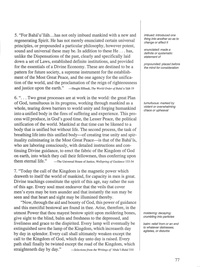 5. “For Baha’u’ll4h...has not only imbued mankind with a new and
regenerating Spirit. He has not merely enunciated certain universal
principles, or propounded a particular philosophy, however potent,
sound and universal these may be. In addition to these He . . . has,
unlike the Dispensations of the past, clearly and specifically laid
down a set of Laws, established definite institutions, and provided
for the essentials of a Divine Economy. These are destined to be a
pattern for future society, a supreme instrument for the establishment of the Most Great Peace, and the one agency for the unification of the world, and the proclamation of the reign of righteousness
and justice upon the earth.” —shoghi Effendi, The World Order of Bahd’u’llah 19
5. “For Baha’u’ll4h...has not only imbued mankind with a new and
regenerating Spirit. He has not merely enunciated certain universal
principles, or propounded a particular philosophy, however potent,
sound and universal these may be. In addition to these He . . . has,
unlike the Dispensations of the past, clearly and specifically laid
down a set of Laws, established definite institutions, and provided
for the essentials of a Divine Economy. These are destined to be a
pattern for future society, a supreme instrument for the establishment of the Most Great Peace, and the one agency for the unification of the world, and the proclamation of the reign of righteousness
and justice upon the earth.” —shoghi Effendi, The World Order of Bahd’u’llah 19
6. ““. .. Two great processes are at work in the world: the great Plan of God, tumultuous in its progress, working through mankind as a whole, tearing down barriers to world unity and forging humankind into a unified body in the fires of suffering and experience. This process will produce, in God’s good time, the Lesser Peace, the political unification of the world. Mankind at that time can be likened to a body that is unified but without life. The second process, the task of breathing life into this unified body—of creating true unity and spirituality culminating in the Most Great Peace—is that of the Baha’is, who are laboring consciously, with detailed instructions and continuing Divine guidance, to erect the fabric of the Kingdom of God on earth, into which they call their fellowmen, thus conferring upon them eternal life.” —tThe Universal House of Justice, Wellspring of Guidance 133-34
7. “Today the call of the Kingdom is the magnetic power which draweth to itself the world of mankind, for capacity in men is great. Divine teachings constitute the spirit of this age, nay rather the sun of this age. Every soul must endeavor that the veils that cover men’s eyes may be torn asunder and that instantly the sun may be seen and that heart and sight may be illumined thereby.
“Now, through the aid and bounty of God, this power of guidance and this merciful bestowal are found in thee. Arise, therefore, in the utmost Power that thou mayest bestow spirit upon moldering bones, give sight to the blind, balm and freshness to the depressed, and liveliness and grace to the dispirited. Every lamp will eventually be extinguished save the lamp of the Kingdom, which increaseth day by day in splendor. Every call shall ultimately weaken except the call to the Kingdom of God, which day unto day is raised. Every path shall finally be twisted except the road of the Kingdom, which straighteneth day by day.” —Selections from the Writings of ‘Abdu’l-Bahd 310
imbued: introduced one thing into another so as to change or affect it
enunciated: made a definite or systematic statement of
propounded: placed before the mind for consideration
tumultuous: marked by violent or overwhelming chaos or upheaval
moldering: decaying; crumbling into particles
balm: relief from or an end
to whatever distresses, agitates, or disturbs
77
[Page 78]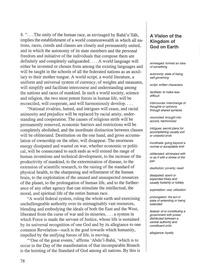 8. “... The unity of the human race, as envisaged by Baha’u’ lah,
implies the establishment of a world commonwealth in which all nations, races, creeds and classes are closely and permanently united,
and in which the autonomy of its state members and the personal
freedom and initiative of the individuals that compose them are
definitely and completely safeguarded. ... A world language will
either be invented or chosen from among the existing languages and
will be taught in the schools of all the federated nations as an auxiliary to their mother tongue. A world script, a world literature, a
uniform and universal system of currency, of weights and measures,
will simplify and facilitate intercourse and understanding among
the nations and races of mankind. In such a world society, science
and religion, the two most potent forces in human life, will be
reconciled, will cooperate, and will harmoniously develop... .
8. “... The unity of the human race, as envisaged by Baha’u’ lah,
implies the establishment of a world commonwealth in which all nations, races, creeds and classes are closely and permanently united,
and in which the autonomy of its state members and the personal
freedom and initiative of the individuals that compose them are
definitely and completely safeguarded. ... A world language will
either be invented or chosen from among the existing languages and
will be taught in the schools of all the federated nations as an auxiliary to their mother tongue. A world script, a world literature, a
uniform and universal system of currency, of weights and measures,
will simplify and facilitate intercourse and understanding among
the nations and races of mankind. In such a world society, science
and religion, the two most potent forces in human life, will be
reconciled, will cooperate, and will harmoniously develop... .
“National rivalries, hatred, and intrigues will cease, and racial animosity and prejudice will be replaced by racial amity, understanding and cooperation. The causes of religious strife will be permanently removed, economic barriers and restrictions will be completely abolished, and the inordinate distinction between classes will be obliterated. Destitution on the one hand, and gross accumulation of ownership on the other, will disappear. The enormous energy dissipated and wasted on war, whether economic or political, will be consecrated to such ends as will extend the range of human inventions and technical development, to the increase of the productivity of mankind, to the extermination of disease, to the extension of scientific research, to the raising of the standard of physical health, to the sharpening and refinement of the human brain, to the exploitation of the unused and unsuspected resources of the planet, to the prolongation of human life, and to the furtherance of any other agency that can stimulate the intellectual, the moral, and spiritual life of the entire human race.
“A world federal system, ruling the whole earth and exercising unchallengeable authority over its unimaginably vast resources, blending and embodying the ideals of both the East and the West, liberated from the curse of war and its miseries, ... a system in which Force is made the servant of Justice, whose life is sustained by its universal recognition of one God and by its allegiance to one common Revelation—such is the goal towards which humanity, impelled by the unifying forces of life, is moving.
““One of the great events,’ affirms ‘Abdu’1-Baha, ‘which is to occur in the Day of the manifestation of that incomparable Branch is the hoisting of the Standard of God among all nations. By this is
78
A Vision of the Kingdom of God on Earth
envisaged: formed an idea of something
autonomy: state of being self-governing
script: written characters
facilitate: to make less difficult
intercourse: interchange of thoughts or opinions through shared symbols
reconciled: brought into accord, harmonized
intrigues: secret plans for accomplishing usually evil or unlawful ends
inordinate: going beyond a normal or acceptable limit
obliterated: eliminated with or as if with a stroke of the pen
destitution: poverty; need
dissipated: spent or expended freely and usually foolishly or futilely
exploitation: use; utilization
prolongation: the act or state of extending or being extended
federal: of or constituting a government with power distributed between a central authority and constituent units
allegiance: loyalty
[Page 79]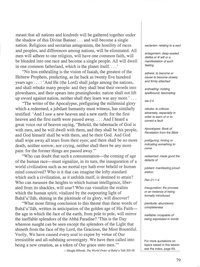 meant that all nations and kindreds will be gathered together under
the shadow of this Divine Banner . . . and will become a single
nation. Religious and sectarian antagonism, the hostility of races
and peoples, and differences among nations, will be eliminated. All
men will adhere to one religion, will have one common faith, will
be blended into one race and become a single people. All will dwell
in one common fatherland, which is the planet itself. . . .’
meant that all nations and kindreds will be gathered together under
the shadow of this Divine Banner . . . and will become a single
nation. Religious and sectarian antagonism, the hostility of races
and peoples, and differences among nations, will be eliminated. All
men will adhere to one religion, will have one common faith, will
be blended into one race and become a single people. All will dwell
in one common fatherland, which is the planet itself. . . .’
“No less enthralling is the vision of Isaiah, the greatest of the Hebrew Prophets, predicting, as far back as twenty five hundred years ago ...: ‘And He (the Lord) shall judge among the nations, and shall rebuke many people: and they shall beat their swords into plowshares, and their spears into pruninghooks: nation shall not lift up sword against nation, neither shall they learn war any more.’ ...
“The writer of the Apocalypse, prefiguring the millennial glory which a redeemed, a jubilant humanity must witness, has similarly testified: ‘And I saw a new heaven and a new earth: for the first heaven and the first earth were passed away. ... And I heard a great voice out of heaven saying, “Behold, the tabernacle of God is with men, and he will dwell with them, and they shall be his people, and God himself shall be with them, and be their God. And God shall wipe away all tears from their eyes; and there shall be no more death, neither sorrow, nor crying, neither shall there be any more pain: for the former things are passed away.”
“Who can doubt that such a consummation—the coming of age of the human race—must signalize, in its turn, the inauguration of a world civilization such as no mortal eye hath ever beheld or human mind conceived? Who is it that can imagine the lofty standard which such a civilization, as it unfolds itself, is destined to attain? Who can measure the heights to which human intelligence, liberated from its shackles, will soar? Who can visualize the realms which the human spirit, vitalized by the outpouring light of Baha’u’ lah, shining in the plenitude of its glory, will discover?
‘What more fitting conclusion to this theme than these words of Baha’u’ 14h, written in anticipation of the golden age of His Faith— the age in which the face of the earth, from pole to pole, will mirror the ineffable splendors of the Abha Paradise? “This is the Day whereon naught can be seen except the splendors of the Light that shineth from the face of thy Lord, the Gracious, the Most Bountiful. Verily, We have caused every soul to expire by virtue of Our irresistible and all-subduing sovereignty. We have then called into being a new creation, as a token of Our grace unto men.’”
—Shoghi Effendi, The World Order of Bahd’u’llah 203-06
sectarian: relating to a sect
antagonism: deep-seated dislike or ill will or a manifestation of such feeling
adhere: to become or cause to become closely and firmly attached
enthralling: holding spellbound; fascinating
Isa 2:4
rebuke: to criticize adversely, especially in order to warn of or to correct a fault
Apocalypse: Book of Revelation from the Bible
prefiguring: hinting or indicating something to come
redeemed: made good the defects of
jubilant: manifesting proud elation
Rev 21:1-4 inauguration: the process or an instance of being
formally introduced
plenitude: abundance; completeness
ineffable: incapable of being expressed in words
For more quotations on topics raised in this lesson
see the index, page 83.
79
[Page 80]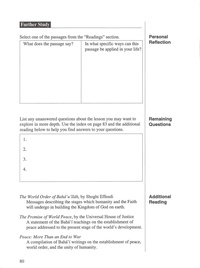 Further Study
Further Study
Select one of the passages from the “Readings” section.
What does the passage say? In what specific ways can this passage be applied in your life?
List any unanswered questions about the lesson you may want to explore in more depth. Use the index on page 83 and the additional reading below to help you find answers to your questions.
1.
De
The World Order of Bahaé’u’llah, by Shoghi Effendi Messages describing the stages which humanity and the Faith will undergo in building the Kingdom of God on earth.
The Promise of World Peace, by the Universal House of Justice A statement of the Baha’f teachings on the establishment of
peace addressed to the present stage of the world’s development.
Peace: More Than an End to War A compilation of Baha’i writings on the establishment of peace, world order, and the unity of humanity.
80
Personal Reflection
Remaining Questions
Additional
Reading
[Page 81]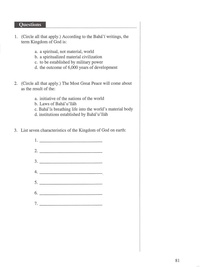
Questions
1. (Circle all that apply.) According to the Baha’i writings, the term Kingdom of God is:
a. a Spiritual, not material, world
b. a spiritualized material civilization
c. to be established by military power
d. the outcome of 6,000 years of development
2. (Circle all that apply.) The Most Great Peace will come about as the result of the:
a. initiative of the nations of the world
b. Laws of Baha’u’ lah
c. Baha’is breathing life into the world’s material body d. institutions established by Baha’u lah
3. List seven characteristics of the Kingdom of God on earth:
1
2.
81
[Page 82]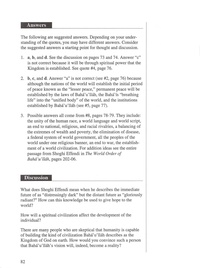 Answers
Answers
The following are suggested answers. Depending on your understanding of the quotes, you may have different answers. Consider the suggested answers a starting point for thought and discussion.
66 99
1. a,b, and d. See the discussion on pages 73 and 74. Answer “c is not correct because it will be through spiritual power that the Kingdom is established. See quote #4, page 76.
2. b,c, and d. Answer “a” is not correct (see #2, page 76) because although the nations of the world will establish the initial period of peace known as the “lesser peace,” permanent peace will be established by the laws of Baha’u’ lah, the Baha’is “breathing life” into the “unified body” of the world, and the institutions established by Baha’u’llah (see #5, page 77).
3. Possible answers all come from #8, pages 78-79. They include: the unity of the human race, a world language and world script, an end to national, religious, and racial rivalries, a balancing of the extremes of wealth and poverty, the elimination of disease, a federal system of world government, all the peoples of the world under one religious banner, an end to war, the establishment of a world civilization. For addition ideas see the entire passage from Shoghi Effendi in The World Order of Bahd’u’ lah, pages 202-06.
Discussion
What does Shoghi Effendi mean when he describes the immediate future of as “distressingly dark” but the distant future as “gloriously radiant?” How can this knowledge be used to give hope to the world?
How will a spiritual civilization affect the development of the individual?
There are many people who are skeptical that humanity is capable of building the kind of civilization Baha’u’llah describes as the Kingdom of God on earth. How would you convince such a person that Baha’u’1lah’s vision will, indeed, become a reality?
82
